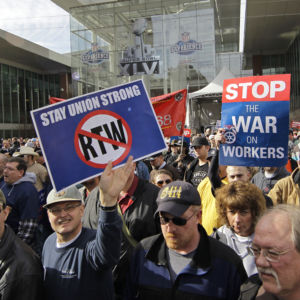Congressional Republicans introduced a measure Wednesday aimed at making union dues voluntary for everyone across the country.
Federal law currently allows states to decide on their own whether they want to be right-to-work. The policy outlaws mandatory union dues or fees as a condition of employment. Republican representatives Joe Wilson and Steve King introduced the measure in the hopes of making the law national.
“Our bill would protect workers by eliminating the forced-dues clauses in federal statute,” Rep. Wilson said in a statement provided to InsideSources. “Right-to-work states, like South Carolina, have seen first-hand that job creation and economic growth comes from expanded freedoms.”
Kentucky became the most recent state to pass right-to-work following 26 others. Those in support argue the policy merely gives workers a choice while creating a more business friendly environment. The National Right to Work Committee (NRTW) has been at the forefront of supporting the policy.
“Voluntary association is a quintessential American ideal, and the case for Right to Work has always rested on the principles of employee freedom,” NRTW President Mark Mix said in a statement provided to InsideSources. “But passage of a National Right to Work law will also pay economic dividends.”
Democrats, labor unions and other critics, however, warn it could undermine worker rights. They argue it hampers how effective unions are at negotiating with employers, which allows them to lower wages, benefits and workplace standards.
“By many measures, quality of life is worse in states with right to work laws,” the AFL-CIO claims on its website. “Wages are lower, people are less likely to have health insurance and the necessary resources for a quality education, poverty levels are higher as are workplace fatality rates.”
Research has been fairly mixed when it comes to what impact right-to-work actually has on workers. The Economic Policy Institute found the policy results in decreased wages and benefits. The Heritage Foundation, however, found wages and benefits in right-to-work states aren’t actually less when you adjust for the cost of living.
Unions have often attacked right-to-work as a means of destroying the labor movement. The policy, however, usually only causes a decline in membership within the first year before it bounces back to a consistent level. Union behavior and changes to the local economy are likely the primary reasons unions membership bounces back.
The passage of the 1947 Taft-Hartley Act first allowed states to decide whether they want to be right-to-work or not. Americans overwhelming support the policy despite its very adamant opponents. Gallup found in a 2014 poll the policy has 71 percent support. The same poll showed unions were generally supported as well but at only 53 percent.
A national right-to-work law would have a huge impact and is likely to face fierce opposition. Nevertheless, Republicans hold a congressional majority, making its passage a possibility. President Donald Trump has already noted his support for right-to-work laws.

